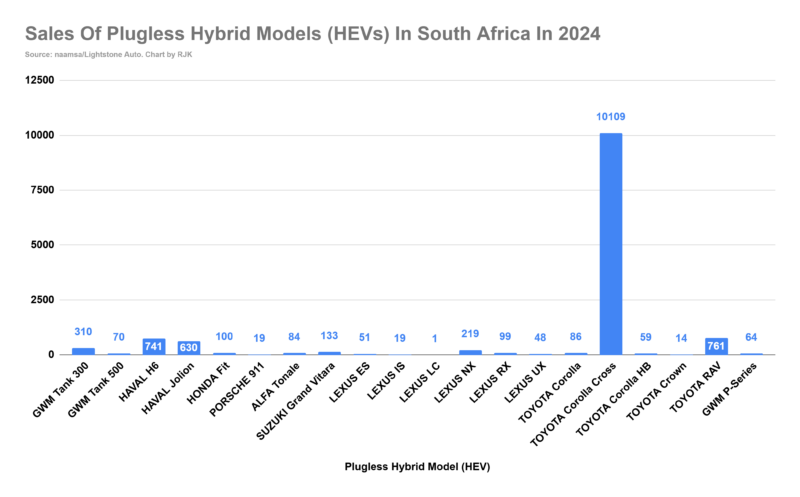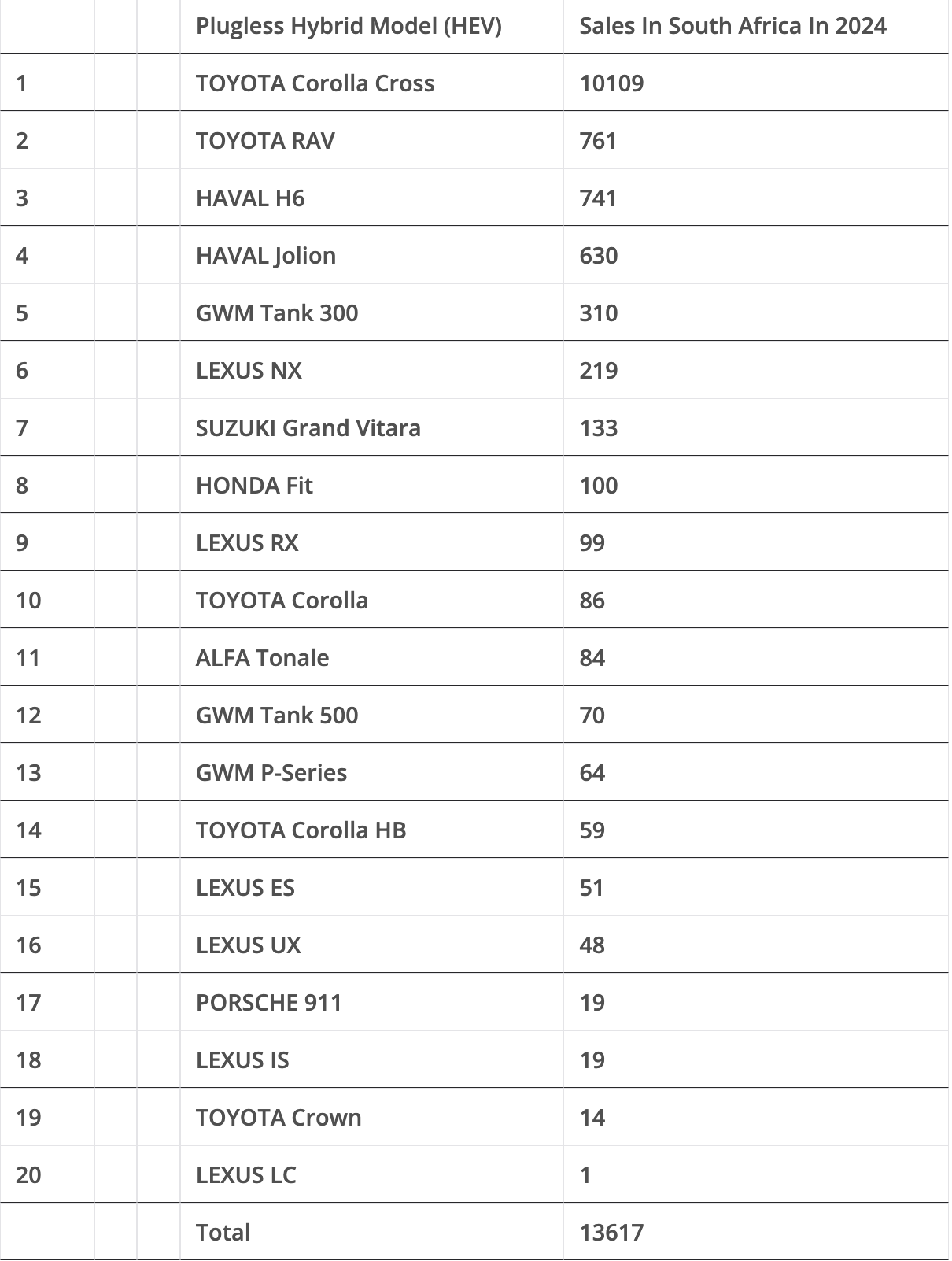
Sign up for daily news updates from CleanTechnica on email. Or follow us on Google News!
South Africa has a decently-sized new vehicle sales market. In 2024, just over half a million new vehicles (515,712) were sold in South Africa, a decrease of 3% from the 531,775 units sold in 2023. However, over 96% of all the new vehicles sold in South Africa are still internal combustion engine vehicles. There is some steady progress. Sales of battery-electric vehicles (BEV) breached the 1,000 units per year mark in South Africa for the first time ever in 2024. Last year, 1,257 BEVs were sold there, up 35% from 929 units sold in 2023. So, BEVs were up 35%, which is quite impressive, although this is coming from a very small base (BEVs make up only 0.24% of sales in South Africa).

Looking at the plugin hybrid electric vehicle (PHEV) market, 737 PHEVs were sold in 2024, up 100% from 368 units sold in 2023. However, PHEVs only made up 0.14% of total vehicle sales in South Africa in 2024. So, BEVs and PHEVs are still under 1% of annual sales in South Africa.
How about plugless traditional hybrids, more commonly known as HEVs? Well, sales of HEVs are starting to take off in South Africa, which is quite strange in a way as these have been common in Europe and places like Japan for a while and are even starting to see declining market share in a lot of countries now. In 2024, over 10,000 HEVs were sold in South Africa. 13,617 HEVs were sold last year making up 2.64% of sales. Leading the pack was the Toyota Corolla Cross with 10,109 units sold in 2024. That means 74% of all HEVs sold in South Africa were the Toyota Corolla Cross. Looking at the top 20 HEV list, there are a lot of Toyotas on that list. Of course, Toyota has been championing HEVs over BEVs globally for a long time now. Toyota does offer a PHEV version of one of its models in South Africa, but has not really been promoting it. Toyota doesn’t yet offer any BEV models in South Africa, unfortunately.
The Top 20 HEV Sales Chart For 2024 In South Africa

Looking at this list, except for Porsche and Alfa Romeo, one can see that it is the Japanese and Chinese automakers that are bringing HEVs to South Africa. The growing list of Chinese ICE and HEV models on sale in South Africa could be a precursor to the brands launching their PHEV models and ultimately their BEV models. Probably they are using these models to introduce and cement their brand presence in the market before bringing BEVs, which now dominate the sales charts in China. Which brings the question, HEVs have been around in other parts of the world for over a decade and a half, but have not been that prominent in South Africa up till now. With advancements in electric vehicle technologies, is it not better for South Africa to totally skip this HEV phase and jump straight into the longer range PHEV and BEV era?
Perhaps South Africans could start with longer range PHEVs then move to focus on BEVs. Although PHEVs divide opinion all the time, as they have for years, they certainly present a better deal than HEVs. A lot of people feel that with the way BEV tech has advanced in recent times, PHEVs are no longer needed as a transition option to full electric. However, as Dr. Maximilian Holland says, “BEVs pollute less than PHEVs, but the latter still have a critical role in certain niches where BEVs may not yet fully meet users’ needs. PHEVs (or EREVs) — when plugged in as designed — pollute a lot less than HEVs, which in turn pollute less than diesels!”
So, if we want to really reduce emissions, HEVs should really not be encouraged in 2025. Longer range PHEVs, although not the ideal solution, should be a better proposition than HEVs in 2025 as the drivers charge their battery packs most of the time and get better value from their vehicles in the process.
More PHEVs are on the way to South Africa in 2025. The BYD Shark 06 PHEV is one of the most anticipated ones. It has a real-world range in electric mode of about 80 km from its 29.6 kWh battery, and the Ford Ranger PHEV has a range of about 45 km from a smaller battery pack. Perhaps PHEVs with electric ranges of 200–300 km would appeal to non-early adopters, especially in markets such as South Africa where the BEV market is still quite small compared with similar markets around the world. Perhaps this is what some Chinese automakers are thinking, as quite a number of them are contributing to a new wave of new-generation PHEVs with battery packs of over 50 kWh and electric ranges of about 200 km, thereafter, complemented by a 1.5T or 2.0T ICE engine. Over the past couple of years, these “longer range” PHEVs were mostly sold in the local Chinese market, but we are now starting to see them being exported to several markets, including in Asia and in Central and South America.
Just this week, two new PHEVs have been confirmed for South Africa. PHEV variants of the Jaecoo J7 and Omoda C9 are on their way to South Africa. The full ICE versions of these models are already available in South Africa, and now they are getting PHEV versions. The J7 has an 18.3kWh lithium-iron-phosphate (LFP) battery that can provide up to 90km of electric range. Will this be a new trend for South Africa where players in the auto industry start bringing in more PHEVs? It looks like it for the Chinese auto firms. Japanese firms, on the other hand, look like they will persist with their preferred HEVs for now. Let’s wait and see. The good news is quite a number of exciting BEV models will be launched in 2025 in South Africa, and these should give the BEV sales market a decent boost in 2025.
Chip in a few dollars a month to help support independent cleantech coverage that helps to accelerate the cleantech revolution!
Have a tip for CleanTechnica? Want to advertise? Want to suggest a guest for our CleanTech Talk podcast? Contact us here.
Sign up for our daily newsletter for 15 new cleantech stories a day. Or sign up for our weekly one if daily is too frequent.
CleanTechnica uses affiliate links. See our policy here.
CleanTechnica’s Comment Policy



